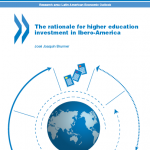 La serie Working Papers del OECD Development Centre, con el Núm. 319, publicó el estudio “The rationale for higher education investment in Ibero-America” de J. J. Brunner.
La serie Working Papers del OECD Development Centre, con el Núm. 319, publicó el estudio “The rationale for higher education investment in Ibero-America” de J. J. Brunner.
Bajar el texto completo aquí: WP319 AE-2
TABLE OF CONTENTS
ACKNOWLEDGEMENTS ………………………………………………………………………………………………………….. 4
PREFACE …………………………………………………………………………………………………………………………………… 5
RÉSUMÉ ……………………………………………………………………………………………………………………………………. 7
ABSTRACT ………………………………………………………………………………………………………………………………… 8
I. INTRODUCTION …………………………………………………………………………………………………………………… 9
II. CURRENT DYNAMICS: MIXED PROVISION, HIGH RETURNS ………………………………………… 13
III. ARE SOCIAL BENEFITS AT THE SAME LEVEL? IDENTIFYING CRITICAL BOTTLENECKS ………………………………………………………………………………………………………. 20
IV. HIGHER EDUCATION AND THE PUBLIC SPHERE: ADDITIONAL BOTTLENECKS ……… 29
V. THE HIGHER EDUCATION COST SPIRAL AND THE NEED FOR COST SHARING ………… 34
VI. CONCLUSIONS …………………………………………………………………………………………………………………. 40
REFERENCES ………………………………………………………………………………………………………………………….. 42
OTHER TITLES IN THE SERIES/ AUTRES TITRES DANS LA SÉRIE ………………………………………. 51
PREFACE
Tertiary or higher education is a key driver of social and economic progress. This is particularly true in an increasingly knowledge-based economy and society, where higher education plays a decisive role in the creation and dissemination of high-level knowledge, as well as in putting it to use for the benefit of the society.
Higher education has gained importance on national agendas, as it generates both economic and non-economic benefits for societies as a whole and for individuals. From a macroeconomic perspective, higher education can play a decisive role in the upgrading and diversification of the economic structure. The creation and dissemination of knowledge is a driver of innovation, competitiveness and productivity gains. This is particularly relevant for Latin America which is in search of a more sustainable growth model based on endogenous engines of growth that would reduce its dependence on external sources. From a social point of view, higher education contributes to social progress by enhancing social mobility and social cohesion and supporting an inclusive pattern of growth. Finally, from an individual perspective, higher education endows individuals with better training and more sophisticated skills, therefore increasing their prospects for better paid and higher quality jobs and favouring their inclusion in labour markets.
One of the main debates around higher education in Latin America is related to its financing. An increasingly globalised higher education landscape puts competitive pressure on institutions faced with the need to improve their performance in order to attract students and meet international standards. Additionally, some of the main challenges of higher education in the region remain unsolved, mainly those related to the quality, pertinence and access to higher education. Finally, a rising middle class demands higher quality public services that also increase opportunities in a broad sense across socioeconomic groups. All these factors require that more financial resources are allocated to higher education so that its potential impact on economic and social progress can be achieved.
This working paper contributes to the debate around the financing of higher education and calls for a fair distribution of the costs of higher education between the private sector (including students and their families) and the public sector, allocated according to the ratio of private and public benefits and externalities that it generates. In particular, it indicates that approximately half of the benefits derived from higher education are private while the other half are social benefits and public externalities. However, several bottlenecks and inefficiencies limit the benefits generated by higher education institutions in Latin America. Overcoming these limitations will be critical to strengthening the impact and benefits of higher education, as well as to legitimating a more balanced funding pattern from public and private sources.
Mario Pezzini
Director
OECD Development Centre
August 2013
0 Comments